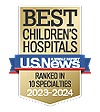
May 15 is recognized around the world as Tuberous Sclerosis Complex (TSC) Awareness Day, in an effort to bring attention to tuberous sclerosis complex. TSC is a genetic disorder that causes tubers (potato-like nodules) to form in many different organs, primarily the brain, eyes, heart, kidneys, skin and lungs. The aspects of TSC that most strongly impact quality of life are generally associated with the brain: seizures and developmental delays. Seizures remain one of the most common neurological features of TSC; therefore, the early diagnosis and treatment of these seizures are critically important.
Kaitlyn Steben researched TSC and knew how vital it was for her daughter Hadlee to receive treatment and care as soon as possible, as Hadlee was in the crucial early stages of childhood development.
“She was having more than 20 seizures a day, and the medication and treatment didn’t seem to be working,” Steben said. “We started researching TSC and came across a video about a young girl named Gracin, a little bit older than Hadlee, who was treated at Stanford Medicine Children’s Health, and when I saw Gracin’s mom talk in the video, I could relate.”
Steben reached out to Hadlee’s primary care doctor and asked for a referral to Stanford Medicine Children’s Health–Lucile Packard Children’s Hospital Stanford. Within three days, she received a call that she later said would change her daughter’s life.
“I picked up the phone and it was Dr. Porter on the other end, and I just couldn’t believe it,” Steben recalled. “I even covered the phone’s speaker and mouthed to my husband, ‘It’s Dr. Porter.’” She was so surprised and almost “starstruck” because of the quick response from Brenda Porter MD, a Professor of Neurology at Stanford University School of Medicine and a specialist in TSC. “It was the woman from Gracin’s video,” Steben said. “She was so kind and thoughtful, even over the phone, I had an almost immediate sense of relief because of the care and attention that she was giving me.”
During their conversation, Steben shared with Dr. Porter her concern that the medications hadn’t seemed to curb the seizures, and so Dr. Porter asked Steben to bring Hadlee out for more detailed testing. That’s when the family of five—Kaitlyn; her husband, Ty; and their three daughters, Laine, Hadlee and Cora (an infant at the time)—made their first visit to Lucile Packard Children’s Hospital.
“We first did a stereo electroencephalogram [EEG], a test that requires the placement of several small electrodes into the brain, each less than 1 mm in diameter, which measure the electrical activity. The stereo EEG allowed us to localize the interference the tubers were causing to disrupt the normal neural network in the brain,” said Gerald Grant MD, Professor of Neurosurgery and, by courtesy, Neurology at Stanford University Medical Center and Chief of Pediatric Neurosurgery at Lucile Packard Children’s Hospital.
The stereo EEG placement luckily showed localized onset of the seizures but in two separate areas of the brain. Hadlee has had two surgeries to remove large tubers and the surrounding hot area causing the seizures in her brain. The first was in May 2018, and the most recent one was this past March.
“Hadlee’s development was stalled, and since she made a great recovery after the first surgery, Dr. Porter and I discussed a second surgery. Her motor skills were improved from the first surgery, but she was still having seizures from the second source, which was close to her speech centers,” Dr. Grant said.
Within days after the second surgery, Hadlee began to show remarkable progress. “She started flipping through a book—she had never done that. We could see her attention and engagement; she started babbling nonstop; she was doing amazing,” he said.

Photo credit: Kaitlyn Steben
Team Hadlee, as her mother affectionately refers to them, includes the Steben family, the entire community of Torrington, Wyoming (population 5,500), and the care team at Stanford Medicine Children’s Health.
“Being in a small town, we can’t go to the grocery store without someone asking how Hadlee is doing. It’s really touching to have so many people care about her,” she added.
Soon after the Stebens arrived back in Wyoming, Drs. Grant and Porter began receiving updates from Steben, including detailed notes and videos on a weekly basis.
“They may seem like simple milestones, but for us they were huge. I recorded Hadlee saying ‘please’ when she wanted something and saying the letter ‘H,’ as in the first letter of her name,” Steben said.
Hadlee also began to engage more with her older sister. Her favorite things to do are reading with Laine and helping on the family’s ranch.

Photo credit: Kaitlyn Steben
“The first hospital we were at did not trust my ‘mommy instinct,’ but then we came to Stanford, which has the most amazing teams of doctors, nurses, techs and staff, who have found the perfect balance between medical and scientific knowledge, and trusting the families of their patients,” Steben said. “They have done more for Hadlee than we ever thought possible, and all with a compassion like no other. I am so thankful that everyone on Team Hadlee, they listen.”
For information please contact the Tuberous Sclerosis Complex (TSC) clinic at (650) 723-0993.
Authors
- Kelly Frank
- more by this author...


 Previous
Previous








I would like a Second opinion on a possible TSC case. A possible cure for a 17 months los boy. Best hospitals and Help.
Thank you
Fanny Reinoso
Grandmother
Hi Fanny.
For in-person second opinions, please call 1-800-995-5724 or email SCHGRSecondOpinion@StanfordChildrens.org. You can also request a second opinion by visiting https://grandrounds.com/stanfordmedicine-alt/.
Keep up the great work Professor Grant. You have saved so many children and their families. My son is Dr. Grant’s patient and he is doing so well. Very grateful for LPCH and the Doctor.